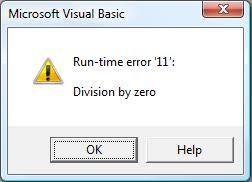
What is the use of Visual Studio software? What are the different types of Microsoft Visual Basic error? What are the causes?
Different Microsoft Visual Basic Error Types

Visual Studio is a programming environment integrated with graphical users interface to choose and edit preselected sections of code written in the BASIC language. There are two types of errors that occur; they are Run Time error and Compile Time error. Run Time error pops-up when you try to run an application in Visual Studio or a stand-alone executable file. Compile error occur when you try to compile an application in Visual Studio or at a command prompt. These errors occur when the system can’t execute what the Visual Basic application is trying to an action.

Different Microsoft Visual Basic Error Types

Microsoft Visual Studio is an IDE or an Integrated Development Environment from Microsoft and is used to develop applications including websites, web apps, mobile apps, and web services. It uses Microsoft software development platforms like Windows API, Windows Forms, Microsoft Silverlight, Windows Presentation Foundation, and Windows Store. Microsoft Visual Studio can create both managed and native codes.
It has a code editor that supports IntelliSense, the code completion component, and also code refactoring. The integrated or built-in debugger functions as both machine-level debugger and source-level debugger. Other built-in tools in Microsoft Visual Studio include a code profiler, database schema designer, web designer, class designer, and forms designer for building GUI applications. It also supports plug-ins that improves the functionality at almost every level.
Microsoft Visual Studio supports 36 different programming languages. It allows the debugger and code editor to support almost any programming language to varying degrees provided a language-specific service exists. Built-in programming languages include C#, F#, C++, C, C++/CLI, Visual Basic .NET, JavaScript, TypeScript, XML, XSLT, HTML, and CSS. Support for other programming languages like Node.js, M, Python, and Ruby is available through plug-ins.














